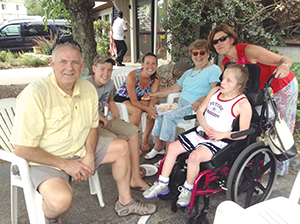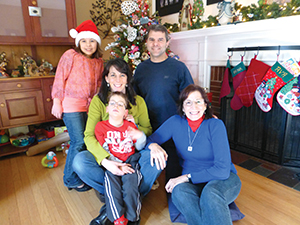By NANCY FRAZIER O’BRIEN
Most parents approach their child’s 21st birthday with a sense of celebration for the exciting possibilities ahead and a dash of apprehension. But for the parents of severely disabled children, who lose many government-funded services at 21, it’s a whole different story.

The Bolton family relaxes together at a July 4 picnic at St. Vincent's Adult Special Needs Services in Stratford, Conn. From left are Deacon Tim Bolton; Matthew, 13; Meagan, 26; Tim's mother, Alice Bolton; Mary Ellen Bolton, and Kaitlin, 22. Missing from the photo is son Tim, who lives in Phoenix.
"Even hearing and blind services go away when you turn 21," said Deacon Tim Bolton, coordinator of pastoral care at St. Vincent’s Medical Center in Bridgeport, Conn., and the father of 22-year-old Kaitlin, who has Wolf-Hirschhorn syndrome. "What, at 21 they’re suddenly not blind anymore?"
But St. Vincent’s Special Needs Services in Trumbull, Conn., has filled a need for the Boltons and many other families as their special needs children transition into adulthood.
The Changing Images program offered by St. Vincent’s for special needs adults "is the only one of its kind in the entire Ascension Health system of (131) hospitals," said Raymond Baldwin Jr., president and chief executive of St. Vincent’s Special Needs Services.
"It goes right to the mission of Ascension and the Daughters of Charity" who founded the system, Baldwin added. "The whole mission of the Daughters of Charity is to take care of the poor and vulnerable, and you could not find a more vulnerable population than this one.
"Continuum of care — that’s what St. Vincent’s Special Needs Services is all about," Baldwin said. "We offer those with special needs comprehensive care at virtually every age and stage of life. Knowing that care won’t end and that there is an organization that will provide lifelong care they can trust gives those with special needs and their families peace of mind and a true sense of belonging."
Profound disability
Kaitlin Bolton’s syndrome, caused by a chromosome deficiency, has left her "100 percent dependent" on others for her daily care, her father said. She is nonverbal, hearing impaired and has cortical blindness, but claps and "sings like maybe a mute would sing," he added. She is "really a social (person), and loves being with people."
She weighs only about 70 pounds and is about 42 inches in height. She has had "a number of spinal surgeries" to install rods, half a rod at a time, and "has been fighting gravity for most of her life," her father said.
If her IQ were measured with the standard tests, it would be "about the same as a 3-month-old," Bolton said. "But that is in no way indicative of the young lady she is."
Day school
Bolton said the assistance provided by St. Vincent’s Special Needs Services "allowed us to function as a family," confident that Kaitlin was safe and well cared for. He and his wife Mary Ellen, an elementary school principal, have a 13-year-old son, Matthew, at home and two other grown children, now "out in the world."
The special needs services offered by St. Vincent’s for severely disabled children and their families begin at birth. Baldwin said, "Once a child has been identified, we work with the parents and caregivers in the home, to prepare them for what awaits in the future."
At 3, the child can begin attending the Feroleto Children’s Development Center in Trumbull, a state-licensed educational facility that provides individualized instruction, therapy and medical care. Eighty people between the ages of 3 and 21 are currently enrolled, and the St. Vincent’s school program was recently expanded to include children with autism spectrum disorder.
"There were limited year-round options locally for children with ASD, a growing population, and (St. Vincent’s) has answered that call," said Dr. Jennifer Robin Lee, child and adolescent psychiatrist and medical director of St. Vincent’s Autism and Developmental Services.
Change agent
When a child reaches the age of 15, the transition team at St. Vincent’s begins to work with the family to "tailor a program that will meet the needs when they reach 21," Baldwin said.
Changing Images was chosen as the name of the program for adults, both to represent the change in lifestyle that the participants are experiencing and to symbolize the societal changes needed in the perceptions of those with disabilities.
Depending on the participant, the day program for adults offers opportunities for recreational activities, group-supported employment or even paid employment in the community. St. Vincent’s Special Needs Services also runs 11 group homes in seven Fairfield County communities, both for children and adults.
Life lessons
Baldwin came to his job at St. Vincent’s Special Needs Services through a circuitous route. Although he said he was "always involved with people with special needs in one form or another," he spent 14 years as a police officer in Trumbull then became an attorney and practiced law for 20 years. He was mayor of Trumbull for eight years before coming to St. Vincent’s four and a half years ago.
Bolton said his career path has been strongly influenced by the birth of his special needs child. When Kaitlin was born, he was 32, working in a family business and "never had an inkling of becoming a deacon, much less a chaplain," he said. "She’s the one who straightened her old man out."
Although Kaitlin and her family are still getting used to the "significant decrease in services at 21 in the case of therapies that she had become accustomed to," Bolton said it is a gift each day to see his daughter experience "love from the moment she is picked up in the morning, given with a smile from her driver that lets us know she’s safe and that our girl will have a great day, whatever she does.
"She’s going to a place where the people know her name, they know her story, and where she matters," he added. "What’s better than that?"
| St. Vincent's Special Needs offers respite along with holiday festivities By BETSY TAYLOR The many pleasures of the holiday season — celebrating a meal together, sharing gifts, visiting with family — pose some challenges for families with a special needs child.  The Vernon family celebrates Christmas 2013. They are, clockwise, dad Walter Vernon, his mother-in-law Angela Crouse, Dina Vernon with her son Grayson on her lap, and his twin sister, Ava. Crouse stays with her daughter's family from Dec. 20 to Jan. 20 to assist with child care during the school break and holiday season. "At the holidays, we try to add the extras" to brighten the season, said Patty Hornak,St. Vincent's Special Needs Services' manager of rehabilitation services. That includes taking Christmas or Hanukkah-themed photos of students, and bringing students in small groups to see a college theater performance. Lightening the load
Dina Vernon, 42, of Hamden, Conn., whose 8-year-old son Grayson attends the school, said last year she sent in a few food items to contribute for Thanksgiving baskets for other families with students at the Feroleto Center. She was touched when her family also received a wrapped gift box, in a project coordinated by St. Vincent's Special Needs Services' family center. It contained a gift card for a turkey and the fixings for Thanksgiving side dishes and pumpkin pie. Having the dinner supplies on hand meant "one less thing" to do to prepare for the
holiday, she said. Vernon said she can't leave Grayson, who has hypotonic cerebral palsy and a seizure disorder, in the care of just anyone. Education assistant Jeff Blain, who works with Grayson, offers to babysit during school and holiday breaks, so that Grayson will have a care provider at the house who knows how to look after him when his parents are at work or if they or other relatives who watch him have other commitments. Grayson, who cannot communicate with words and has limited use of his muscles, raises his hand when he wants to communicate. He has a book with pictures symbolizing words, and nods "yes" or "no" first to indicate what category he wants to communicate about, and then onto the specific message he wants to convey. Blain was instrumental in starting the after-school program, offered one or two afternoons a month in October, November and December. Students can stay at the center through dinnertime. Relatives can attend the dinner, or take the extra time to get caught up on holiday shopping or errands. Blain said it means a lot to him to provide the extra support to students and their families. "Our kids don't ask for much, and they deal with a lot, and just being able to be there for them is the most rewarding thing ever." Big switches
Several of the classrooms host Thanksgiving meals for students and staff. The children work together on a centerpiece and setting the table. Blain said tube-fed students receive their nutrition during the meal so they can enjoy the festivities. "They'll be at the table, part of the conversation, part of the moment," he said. Hornak said before the holidays last year, she spoke at a parents' coffee gathering about where to find toys for children with special needs and ways to adapt existing toys, so they can play with them. She said for about $20 in equipment many electronic toys can be modified with a battery interrupter, and a cord attached to a large switch. Many children with limited dexterity, who might be unable to flick a small switch to turn a toy off and on, are able to trigger a large switch to activate a toy. St. Margaret Mary Church in Shelton, Conn., donates toys, clothing items and accessories for all the Feroleto students at the holidays. Teachers and classroom assistants supply a list of suggested items for each child. Vernon, a finance manager, said the holidays can be a challenging time and require planning for her and her husband, Walter. They usually celebrate Thanksgiving at home with Grayson and his twin sister, Ava, and spend Christmas at a relative's home. St. Vincent's Special Needs Services publishes "News You Can Use" with articles and tips for their families, including ways to reduce stress and activities students might enjoy at the holidays. Vernon finds the articles helpful, and she's developed her own systems for what best works for Grayson when traveling. She packs small canning jars of pureed foods for him, with each meal in its own lunch box. When the family travels, they set aside time to stop and feed him. While the holidays do pose some obstacles, Vernon said when Grayson is feeling well, his attitude lifts everyone's spirits. "When he gives a belly laugh, we all get a belly laugh," his mother said. "He's kind of the glue that keeps us all going." |
Copyright © 2014 by the Catholic Health Association
of the United States
For reprint permission, contact Betty Crosby or call (314) 253-3477.